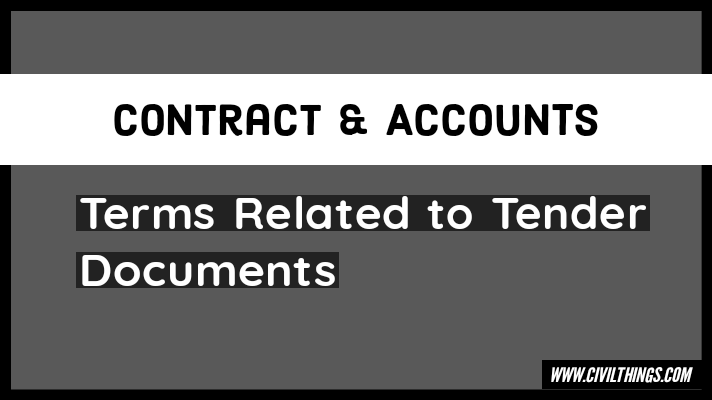Terms Related to Tender Documents:
Contract Conditions:
These are the general terms and conditions of the contract to be complied with by the contractor and are mainly related to the work to be executed. The main object of specifying these terms and conditions is to see that no dispute arises between the department (or owner) and contractor and both parties are kept out of court of law.
Table of Contents

| The conditions specify mainly the following clauses:
1. Amount of security deposit. 2. Compensation for delay. 3. Extension of time. 4. Completion certificate. 5. Monthly bill. 6. Payment of bill. 7. Execution of work by drawing and specifications. 8. Labour 9. Arbitration 10. Supervision of higher officers etc. |
Time Limit:
In contracts the period of completion specify the following methods –
(i) On a given date
(ii) No. of Calendar months.
(iii) Number of working days.
The time allowed for the completion of work or project includes the rainy season also. If the work given to the contractor is not completed or the progress of work is not proportionate to the time passed; then the contractor is liable for a penalty of an amount equal to 1% or such a smaller amount per day as the superintending engineer decides, the maximum is 10% of the tendered amount of the work.
Delays in the completion of work may be caused by the owner or by the contractor,
1. Following are the example due to delays that take place – Bad weather conditions.
2. Disputes with the local authority or with the owner of the adjoining plot.
3. Riots, lockouts, thus affecting the supply of materials.
4. Materials not available in time.
Time Extension:
For time extension contractor has to apply for the executive engineer giving all the particulars and reasons for delay, before one week of expiry of the time limit.
The executive engineer considers the request and verifies the reasons given and may grant an extension on reasonable grounds.
Penalty:
- The penalty is a sort of fine for non-fulfillment of the terms of the contract.
- In case the contractor fails to give satisfactory work or does not observe the specifications and workmanship he can be penalized for bed work or unsatisfactory progress.
- Any work not according to specifications shall be dismantled and reconstructed at the cost of the contract and the amount shall be recovered from his bills.
- In case of bankruptcy, his materials or tools and plants can be forfeited, or if he abandons the work his security deposit also can be confiscated.
- A maximum penalty of up to 10% of the contract amount can be imposed on him.
Defective Material and Workmanship:
- While executing the construction work, if any work is found to be completed with defective material and imperfect or unskilled workmanship, the contractor is liable to remove these defects in work at their own expense.
- If the contractor fails to do this or to recover the defect within a specified period as decided by Engineer. In charge, he has to pay compensation or a penalty of about 1 to 10% per day of the amount of estimate.
- If the contractor fails to recover the defective material, it may be done by inviting another contractor by the Engineer-In-Charge at the cost and risk of the previous contractor.
Termination of Contract:
A contractor may be brought to an end in several ways including the following:
1. When the contractor fails to complete the work by a stipulated date.
2. If the contractor sublets his contract without the written permission of the Department.
3. If the contractor does not fulfill the terms and conditions of the contract as if he leaves the work if he does not maintain progress if he does not observe the rules etc.
4. Mutual agreement between the parties to terminate the contract.
5. The contract agreement may be canceled or rescinded and all of his security money be confiscated or a penalty up to the extent of 10% of the estimated cost may be imposed on the contractor.
Suspension of Work:
If the contractor is not fulfilling the requirements according to drawings and specifications during the execution of work, the work can be suspended and the contractor is informed in writing about the suspension of work. To carry out this work new tenders are invited.
Subletting of Contract:
It means letting the main contractor to another when he has contracts to perform. Such a sub-letting of whole or part of work is not allowed without the owner’s written permission.
Sub-letting or transfer of work is generally not advisable. However, there are circumstances when it is desirable and beneficial for the owner to allow sub-letting.
Such circumstances or situations are as follows-
(a) Subletting part of work to a specialized firm.
(b) Sickness of the contractor.
(c)Death of some of his key personnel.
(d) Financial difficulties faced by contractors.
Extra Items:
These are the items for which rates are not covered under the contract agreement but are to be carried out by the contractor for satisfactory completion of work.
Extra items occur due to unforeseen happenings at the site, changes in the drawing, design, and specification, and addition, and alternations suggested during execution.
An extra item is paid at the rate included in the schedule of the rate or based on the rate derived by detail analysis.
Escalation :
- Escalation clause should be made applicable in respect of those contracts, where the estimated cost of the work put to the tender is more than 5 lakhs and the operative period of the contract is more than 12 months including approved non-penalized extensions if any Both the conditions of the cost of work and period of work should be fulfilled.
- The percentage of work value as labor component and material component for the work should be indicated in the price variation clause by Engineer-In-Charge and should be approved by the competent authorities approving the draft tender papers. Since these components depend on the nature of work and vary from work to work.
For working out percentages of contractors’ materials and labor components in the work, the total of these two components should be taken as 100. These are to be calculated based on estimated break up.
The amount of compensation or price variation to be paid to the contractor is calculated by Empirical formulae.
Arbitration :
- A process of settling the dispute between owner and contractor or department and contractor is called arbitration and the person who settles such dispute is called an arbitrator.
- The arbitrator should be a person of long-standing experience impartial and acceptable to both parties! He should know the rules, procedures, and laws.
- If any dispute arises, the injured party will serve notice to the other party demanding arbitration, within 30 days after the dispute arises.
- The arbitrator will fix updates and timing for hearing the case.
After hearing the case in detail he will give his award which is final and binding on both parties.
In certain special disputes, he is at liberty to refer it to the court of law for its opinion on the matter.
The cost of the proceeding arbitration fees is to be shared by both parties equally as agreed upon earlier.
Price Variation Clause:
- The contract does not allow the contractors to claim any extra amount for variation of prices during the progress of work. Thus the contract price (i.e. estimate cost) shall not be subject to any increase or decrease in prices.
- In the present-day inflationary market, this clause hurts the contractor, and results in the contractor abounding the work. To overcome this difficulty and to do fair justice to the contractor in case of escalation of prices it is advisable to introduce a ‘price variation clause’ in the conditions of the contract, by incorporating in the contract the basic rates of important materials of construction such as steel, cement, sand, teak wood, etc. which are likely to fluctuate in their prices.
Defect Liability Period:
According to the conditions of the contract, the contractor is supposed to remedy all the defects due to faulty
material and bad workmanship which shall appear and be pointed out to him within one year from the date of completion of the work. This period of one year is known as the ‘Defects Liability Period’.
The Engineer-in-charge should assess the defects which may be due to –
i)Faulty planning and designing for which the contractor is not responsible.
ii) Faulty execution of the work for which the contractor is not responsible.
iii) The contractor is responsible for the use of inferior materials and bad workmanship.
If any defect is noticed during the defect liability period, immediately the contractor should be asked to rectify the same. If the contractor fails to attend the same, then the department will get it remedied through another piece worker departmentally and recover the cost from the contractor’s security deposit.
Liquidated Damages :
- Liquidated damage is an amount of compensation payable to the owner or department by a contractor due to a delay in construction.
In the event of delay caused due to the contractor completing the work within the stipulated time, a penalty is imposed on the contractor for each day of delay after the specified time limit is over. This penalty is usually Rs. 50 to Rs. 100 for each day of delay. This penalty is known as liquidated damages. - It has no relationship with the actual damage done. Following are examples:
- ‘A’ supplier contract to supply 100 metric tons of steel to the builder at the rate of 50,500 per metric ton. ‘A’ breaks his promise, now the builder is required to purchase the steel at the rate of Rs. 50,000 per month. So the builder is entitled to compensation from ‘A’ the supplier of Rs. 100 x 500 50,000/
The Liquidated damages are not recoverable in case of
1) Delay in giving possession of the land.
2) Time limit is not mentioned in the contract
3) Delay due to extra items of work.
Unliquidated Damages:
This is known as ordinary damages having relation to the actual damage done.
It will increase or decrease according to the increase or decrease in the damage, for the non-completion of the work within the due date of completion, or not maintain progress as per the condition of the contract.
People Also Search for
price quotation standard tender
Technical services standard
standard tender evaluation
contracts standard tender
list of tender documents in construction
tender package construction
preparation of tender documents in construction
difference between bid document and tender document
what is a bid document in procurement
tender document for framework agreement
standard tender document for framework
standard tender documents procurement
standard tender documents revised
Exam Related FAQ:
Q. Give the meaning of Time extension.
Q. Define Penalty.
Q. Explain any four situations when the contract is terminated.
Q. Explain the term “Escalation”.
Q. Give the meaning of Arbitration.
Q. Define arbitration state qualities of the arbitrator
Q. Explain the Arbitration-system in brief.
Q. Give the meaning of the Defect liability period.
Q. Explain Liquidated-damages in brief
Q. Give the meaning of Liquidated damage.

Hi! I’m Sandip, a civil engineer who loves sharing about Civil Engineering & new ideas and tips. My blog helps you learn about engineering in a fun and easy way!

